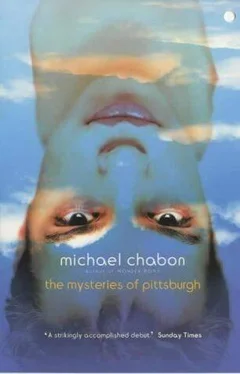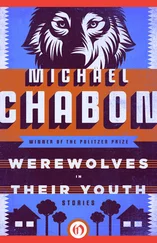Michael Chabon - The Mysteries Of Pittsburgh
Здесь есть возможность читать онлайн «Michael Chabon - The Mysteries Of Pittsburgh» весь текст электронной книги совершенно бесплатно (целиком полную версию без сокращений). В некоторых случаях можно слушать аудио, скачать через торрент в формате fb2 и присутствует краткое содержание. Жанр: Современная проза, на английском языке. Описание произведения, (предисловие) а так же отзывы посетителей доступны на портале библиотеки ЛибКат.
- Название:The Mysteries Of Pittsburgh
- Автор:
- Жанр:
- Год:неизвестен
- ISBN:нет данных
- Рейтинг книги:5 / 5. Голосов: 1
-
Избранное:Добавить в избранное
- Отзывы:
-
Ваша оценка:
- 100
- 1
- 2
- 3
- 4
- 5
The Mysteries Of Pittsburgh: краткое содержание, описание и аннотация
Предлагаем к чтению аннотацию, описание, краткое содержание или предисловие (зависит от того, что написал сам автор книги «The Mysteries Of Pittsburgh»). Если вы не нашли необходимую информацию о книге — напишите в комментариях, мы постараемся отыскать её.
The Mysteries Of Pittsburgh — читать онлайн бесплатно полную книгу (весь текст) целиком
Ниже представлен текст книги, разбитый по страницам. Система сохранения места последней прочитанной страницы, позволяет с удобством читать онлайн бесплатно книгу «The Mysteries Of Pittsburgh», без необходимости каждый раз заново искать на чём Вы остановились. Поставьте закладку, и сможете в любой момент перейти на страницу, на которой закончили чтение.
Интервал:
Закладка:
I found and threw out the badly packed, crumpled photograph (minute figures on a wan beach ring the monster in his dappled shell). Since the rain had stopped and there was still time before Boardwalk expected me and my bad attitude to show up for work, I decided to skip the bus and to walk into Oakland.
The morning was warm; vapor drifted and curled along the fragrant asphalt and covered the golf course as I approached. A bit of antique ribbon rose from the cotton wool of mist around the clubhouse flagpole. As I reached the gates of Schenley Park, the grounds keepers climbed onto their green lawn mowers and filled the air with the utmost sound of a wet summer morning. Hopping the low white rail, I checked as always for the little tangle of graffiti I'd scrawled on it one laughing, runny-nosed night with Claire two winters before. I trod across the long, flawless way of grass, until the scruples drummed into me after years of golfing with my father overcame me, and I stepped off the inviolate links and into a stand of oak that bordered the clubhouse and the eighteenth green.
Running my fingers along the half-tumbled wire-and-picket fence, picking up silvery drops of old rain on the tips of my shoes, I felt a momentary pang for my father, and then, as I pronounced the soft word "Dad" and inhaled the turfy air, I remembered that he was flying into Pittsburgh again tomorrow; we'd have lunch, and I would shout, "Elevator-going up!" and he'd shake his big head, pay the check, and tell me for the tenth time about the Weitzman girl, on a full fellowship at Brandeis, and perfectly lovely, and remarkably intelligent.
The golf course eventually gave way to the parklike skirt of Carnegie-Mellon University, and then the park gave way to the bridge, the ravine, and Oakland. Nothing doing at the Cloud Factory; they weren't making any today. A block of white brick, two beige stacks, an enigmatic series of catwalks and closed doors, the Cloud Factory sat on the other side of the bridge, down the hill from the Carnegie Museum, along the railroad tracks that ran beneath the bridge. The steel confusion of scaffolding and cable around the building seemed to connect it both to the museum above, filled with geodes and dinosaurs, and to the automobile-laden trains that passed alongside it in the night.
As I approached, I looked far below me, into the ravine, and tried to imagine two cravatted schoolboys, kicking through the sand and Coke cans down there, discussing the primes of their lives as though they were yet far off, and not already upon them. Since I had no idea of how Cleveland looked, however, the image was unclear, and anyway, I thought, they would probably have been stoned, just talking about trigonometry, John Lennon, and fathers.
When I reached the end of the bridge, I ducked right, on an impulse, and down a set of concrete stairs I'd never before noticed, which ended in the chain-link and iron grating of a padlocked entrance to the Cloud Factory. From there, steps of wood led down to the sandy floor of the ravine, and I took them, checking my watch; I had a half hour or so. When I hit bottom I looked up at the corroded red bridge stretched over my head, reverberating with each passing car. I came around the Cloud Factory a bit, trying to look through its opaque white windows.
Arthur, I suppose, was content to think it a cloud factory; but I had to know its real purpose before proceeding to pretend I was equally content. I couldn't decide whether the place had to do with the museum or with the rails, however, and after a brief, fruitless examination of some rusted signs lying bent and nearly illegible in the dirt around the building, I turned to climb the steps.
Inside the building something engaged, and a low rumble grew quickly to a whine and a tattoo. I took my steps in time with the metallic tapping of the Cloud Factory, jolted out of my rainy-Tuesday sleepiness. Looking backward at it as I climbed, I had nearly gained the summit when a dense white billow blew from a giant valve, and then spread and rose into the air until a model cloud hung above my head, a textbook cloud, like a sheep, like cotton and all the cloud clichés. At the same time, Phlox rather prissily crossed the bridge on her bicycle, trailing thin scarves, posture perfect, sunglassed face forward and intent, probably, on the waiting white library in the distance. She seemed to be beautifully dressed. I stood still, half hidden against a cold red pile of the bridge, until the cloud began to break apart and she vanished into traffic. I'd spied on Phlox again. Something about her frightened me, though at the time I hadn't the word for it.
As I walked into Boardwalk I caught the unmistakable signs of "it" being "whooped up" in the back room. Gil Frick, ex-Yeshiva, weekend marksman, and a deadly boring shrimp of an engineering student, had been left to attend the front cash register, a rare procedure, the management generally reserving for Gil the tasks it considered too menial or benumbing even for me and my malcontent ilk, such as peeling the price stickers from huge cairns of unsold paperbacks or burying the dead remaindered autobiographies of noncelebrities in the remote and freezing basement. In addition, the fifteen or so customers around the wrestling and men's magazines and the Sports section of the store had their heads turned attentively toward the workroom at the back; some of them seemed to be laughing in deep appreciation of whatever fun was being had back there: shouts, hysterical feminine laughter, someone singing.
"Hey, Gil," I said. "Well! It sounds as though someone is enjoying himself in the rear office." Following Arthur's example, I'd begun to affect an overgrammatical, precious manner toward people like Gil Frick, to keep them, as I imagined Arthur saw it, from wanting to talk to me.
"Yeah, someone," he said. I noticed he sported a small set of facial bruises, and a fresh glum chunk of electrician's tape on his eyeglasses.
"Were you involved in some kind of scuffle or fracas, Gil?"
"No," he said, coloring.
I didn't press it. Crossing the gum-blackened white tile floor from the front of the shop to the bins chock-full of abysmal children's books (this week: Tuffy the Egg and A Zillion and One Really Funny jokes to Tell and Color) by the back room, I decided that the current festivities must be the result either of liquor, despite the early hour, or, more likely, of five or six dozen doughnuts, both of which seeds of brute merriment were sometimes introduced, with pathetically good results, into the usually sere Boardwalk moonscape.
Actually, there were both whiskey and doughnuts, but the laughter was due not to these but to Ed Lavella, three hundred pounds, and his brother Joey, two hundred and seventy-nine pounds, who had on dresses, high heels, and makeup, and in their costumes were demonstrating cardiopulmonary resuscitation.
"Bechstein!" they shouted as I entered the room. "How about a date, you big fag?"
I winced inwardly, though Ed and Joey always called me this; for the first time I took it half-seriously, as though my friendship with Arthur made me gay by association. Of course, I reminded myself, they didn't mean homosexual, exactly; what they meant was: you thin, weak kid whom we could completely crush under our tremendous butts or dismember with very little exertion. I laughed.
"Ha ha," I said. "What is this? Some Like It Fat?"
"Ha ha," said everyone in the room. These included, in addition to the pair of giant future paramedics: three chainsmoking, bulimic young women who occupied various higher levels in the byzantine Boardwalk management hierarchy; Rodney, a tall, quiet black man who had gone to jail for evading the Vietnam draft, and who was now in the process of converting to Catholicism, with the eventual aspiration of becoming a Trappist monk, "like Thomas Merton," who, as Rodney often told me, died in a terrible and ridiculous fashion; and Calvin, another budding paramedic, a fan of knives and small firearms, and Gil Frick's only friend at work-one friend more than I had myself. These people sold books in the shadow of the University of Pittsburgh.
Читать дальшеИнтервал:
Закладка:
Похожие книги на «The Mysteries Of Pittsburgh»
Представляем Вашему вниманию похожие книги на «The Mysteries Of Pittsburgh» списком для выбора. Мы отобрали схожую по названию и смыслу литературу в надежде предоставить читателям больше вариантов отыскать новые, интересные, ещё непрочитанные произведения.
Обсуждение, отзывы о книге «The Mysteries Of Pittsburgh» и просто собственные мнения читателей. Оставьте ваши комментарии, напишите, что Вы думаете о произведении, его смысле или главных героях. Укажите что конкретно понравилось, а что нет, и почему Вы так считаете.












